2019-2020年高二英语译林版选修6教学案:Unit 3 Section 1(含答案)
译林高二上译林选修六Unit3重点词汇讲解和练习(含答案)
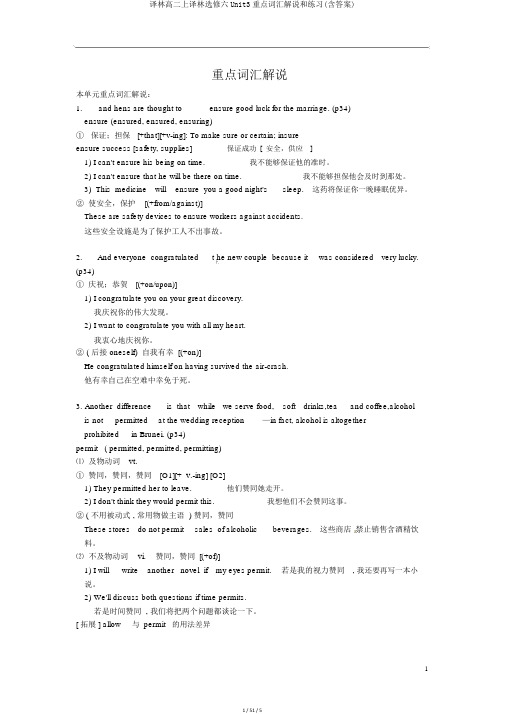
重点词汇解说本单元重点词汇解说:1.and hens are thought to ensure good luck for the marriage. (p34)ensure (ensured, ensured, ensuring)①保证;担保[+that][+v-ing]: To make sure or certain; insureensure success [safety, supplies]保证成功[安全,供应]1) I can't ensure his being on time.我不能够保证他的准时。
2) I can't ensure that he will be there on time.我不能够担保他会及时到那处。
3) This medicine will ensure you a good night's sleep.这药将保证你一晚睡眠优异。
②使安全,保护[(+from/against)]These are safety devices to ensure workers against accidents.这些安全设施是为了保护工人不出事故。
2.And everyone congratulated t he new couple because it was considered very lucky. (p34)①庆祝;恭贺[(+on/upon)]1)I congratulate you on your great discovery.我庆祝你的伟大发现。
2)I want to congratulate you with all my heart.我衷心地庆祝你。
②( 后接 oneself) 自我有幸 [(+on)]He congratulated himself on having survived the air-crash.他有幸自己在空难中幸免于死。
牛津译林高二英语选修六导学案Unit3Understandingeachothergrammar
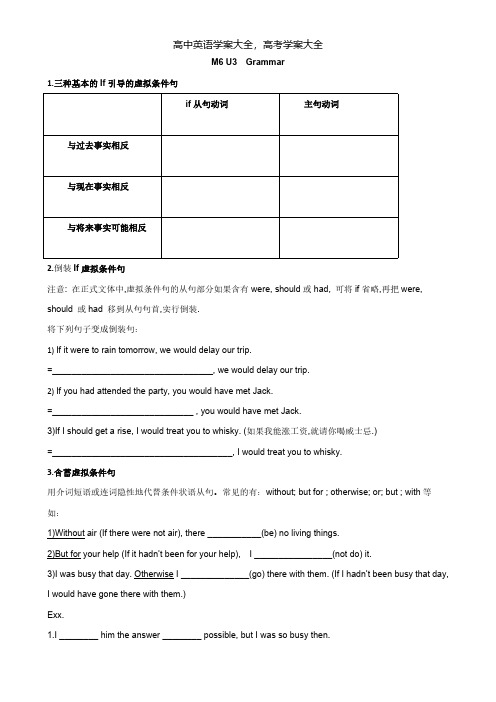
M6 U3 Grammar1.三种基本的If引导的虚拟条件句if从句动词主句动词与过去事实相反与现在事实相反与将来事实可能相反2.倒装If虚拟条件句注意: 在正式文体中,虚拟条件句的从句部分如果含有were, should或had, 可将if省略,再把were, should 或had 移到从句句首,实行倒装.将下列句子变成倒装句:1) If it were to rain tomorrow, we would delay our trip.=_________________________________, we would delay our trip.2) If you had attended the party, you would have met Jack.=_____________________________ , you would have met Jack.3)If I should get a rise, I would treat you to whisky. (如果我能涨工资,就请你喝威士忌.)=_____________________________________, I would treat you to whisky.3.含蓄虚拟条件句用介词短语或连词隐性地代替条件状语从句。
常见的有:without; but for ; otherwise; or; but ; with等如:1)Without air (If there were not air), there ___________(be) no living things.2)But for your help (If it hadn’t been for your help), I ________________(not do) it.3)I was busy that day. Otherwise I ______________(go) there with them. (If I hadn’t been busy that day,I would have gone there with them.)Exx.1.I ________ him the answer ________ possible, but I was so busy then.A. could tell; if it had beenB. must have told; were itC. should have told; had it beenD. should have told; should it be2.But for their common efforts, they ______ achieved so much in their research..A. could haveB. will not haveC. could not haveD. have not3. ______ your advice, I would never have got the job.A. But forB. As forC. Apart fromD. Except for4.He must have missed the train, or he ______ here then.A. should beB. would beC. would have beenD. had to be5. Without electronic computers, much of today’s advanced technology ______ achieved.A. must have beenB. could have beenC. should haveD. would not have been6. I was in a hurry that day. Otherwise I ______ to talk to you.A. had stoppedB. would have stoppedC. stoppedD. had to stop4.混合虚拟条件句很多情况下,从句和主句并不与同一时间的事实相反.例如:1)If you had followed my advice, your English would be much better.从句与__________事实相反,主句与_________事实相反2)If he weren’t a kind-hearted man, he wouldn’t have helped such a man as you that day.从句与__________事实相反,主句与_________事实相反3)If it hadn’t been for you, I would have to make another trip there tomorrow.从句与__________事实相反,主句与_________事实相反Exx.1.Had Paul received six more votes in the last election, he ______ our chairman now.A. must have beenB. would have beenC. wereD. would be2. If you _____ that late movie last night, you wouldn’t be sleepy.A. haven’t watchedB. didn’t watchC. hadn’t watchedD. wouldn’t have watched3. Had you listened to the doctor, you _____ all right now.A. areB. wereC. would beD. would have been5.综合练习1. If you had followed my advice, you ________(be) able to finish the work now.2. If I ______ (be) you, I __________________(go) to her birthday party last night.3. If you _________ (work) hard now, you ___________ (have) a bright future later on.4. _____ it rain tomorrow, we would have to put off the visit to the Bridge.A. WereB. ShouldC. WouldD. Will5. _____ I known he needed money so badly, I might have managed to help him.A. UnlessB. WhenC. IfD. Had6. _____ I be free tomorrow, I could go with you.A. CouldB. ShouldC. MightD. Must7.___________, all the students would hear.A. If the teacher had spoken louderB. If the teacher will speak louderC. Had the teacher spoken louderD. If the teacher spoke louder8. If the professor ______ the experiment on time, he ____very happy.A.finished, would be , B. finished, be C. will finish , will be D. finish , would be9. You didn't let me drive. If we _____ in turn, you _____ so tired.A. drove; didn't getB. drove; wouldn't getC. had driven; wouldn't have gotD. were driving; wouldn't get10.What should we do if it _______tomorrow?A. should snowB. were snowC. snowD. will snow11. If it ________ tomorrow, we would have to put off the visit to the Bridge. Which one is wrong? A. were to rain B. should rain C. would rain D. Rained12.. He must have had an accident, or he____________ here then.A. would have beenB. had beenC. should have beenD. could be13.We didn't know his telephone number, otherwise we _________ him.A. would have telephonedB. must have telephonedC. would telephoneD. had telephoned14. Without electricity human life ________ quite different today.A. isB. will beC. would have beenD. would be15. He hesitated for a moment before kicking the ball, otherwise he ________ a goal.A. had scoredB. scoredC. would scoreD. would have scored。
英语:Unit3_Cultural_differences_教案(牛津译林版选修6)

M6 Unit3 Understanding each otherReading 1 Cultural differencesTeaching Analysis:This lesson is about th e conversation in a chatting room and focused on the cultural differences. Three students from China, Brunei and the UK have a discussion on the Tnternet about this issue. In this section, students will gain some information about the cultures of different countries and learn to communicate cross-culturally. The Reading strategy in this unit teaches students how to understand examples used in texts. Learning Aims1. Knowledge aim:Get more common sense about cultural differ ences2.Ability ai m: 1) Try to develop students’ ability of task based reading.2)Enable the students to master Reading strategy:understanding theuse of examples.3.Emotional aim: 1) Increase students’ awareness of the importance of understandingcultural differences2) Make students proud of our own cultureImportant points1.Help students improve the cultural awareness.2.Students are to finish the related task based assignments so as to develop their exactreading comprehension.Difficult points1.How to get students to participate the class activities actively.2.Try to help students present their ideas on the to pic.Teaching Methods1.Fast reading to identify the basic information2.Task reading as a brief summary of the topic.3.Discussion for cultural differencesTeaching Aids1.The multimedia2.The blackboardTeaching ProceduresStep1: Revision.Discuss the different greeting ways in different countries.Step2: Lead-inStudents have a discussion about cultural differencesStep3:Fast readingStudentsTick out the things mentioned.wedding shoes presents pointing USA/UK cultural differencesan American celebration color of clothingStep4: Detailed readingT/F questions1.Thanksgiving is celebrated by both Americans and the British people.2. In Italy, guests are expected to give presents to the newly-weds as a souvenir to remember the big day.3. It’s good manners for Americans as well as the British to open the prese nts as soon asthey receive them.4. In Brunei it is polite to point to someone with one’s first or index finger. Differences in wedding reception in Brunei?The ma n and the woman __________________.No ________.Play _______ for a long time, sometimes _______.Step5: Task reading_____1_____ differencesn all nightStep6: Reading strategy:understanding the use of examples1)_______________________________________________________2)________________________________________________________3)_______________________________________________________Step7. Summary____________________________________________________________________ Step8: DiscussionHow to understand each other better ? (behavior, respect...)Step9: homework1. Review what we have leant today.2. Preview the language points in this article.Unit 3 Understanding each otherReading 2 Language PointsT eaching aims:After learning this part, the students will be able to:1.retell the cultural differences mentioned in the passage;2.try to remember useful vocabulary and sentences;3.master them by doing some practice.T eaching procedures:Step 1: Revision &Lead-inFill in the blanks according the passage and try to retell the short passage:Mali has to do her homework on 1)_________ differences. So she goes to the student center to interview others and find some 2)____________ she needs.There is the same 3)__________ in the UK and the USA when they get presents. They like to open them as soon as they get them. There are many differences in wedding ceremony between different western and 4)__________ countries. In Korea, guests are surprised to find that they had a live5)________ and a 6)___________ which are supposed to 7)__________ bad spirits away from the wedding 8)__________. Hens are thought to 9)__________ luck for marriage.In Brunei, a male guests has to sit with the 10) ___________and the other men and a 11)_________ gu est has to be with the bride and the other women in a different area. What’s more, if you go to Brunei, you should point with your 12)_____ instead of your first finger, which can cause 13).__________.Bonfire Night is a 14)_________ that happens with plenty of fireworks. So remember when in Rome, do as the 15)_________ do.Step 2: Language points1. … and hens are thought to ensure good luck for the marriage. (P34)ensure (ensured, ensured, ensuring)ensure success [safety, supplies] 保证成功[安全, 供应]1) I can't ensure his being on time. 我不能保证他的准时。
高二英语译林版选修6教案:Unit1 grammar 含解析 精品
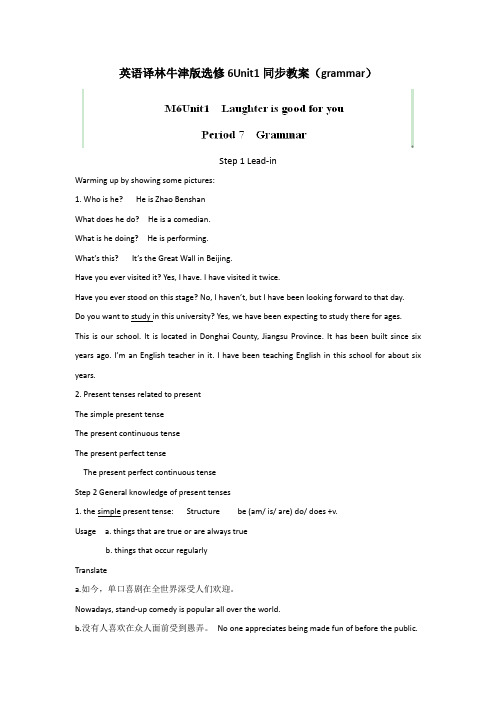
英语译林牛津版选修6Unit1同步教案(grammar)Step 1 Lead-inWarming up by showing some pictures:1. Who is he? He is Zhao BenshanWhat does he do? He is a comedian.What is he doing? He is performing.What’s this? It’s the Great Wall in Beijing.Have you ever visited it? Yes, I have. I have visited it twice.Have you ever stood on this stage? No, I haven’t, but I have been looking forward to that day.Do you want to study in this university? Yes, we have been expecting to study there for ages. This is our school. It is located in Donghai County, Jiangsu Province. It has been built since six years ago. I’m an English teacher in it. I have been teaching English in this school for about six years.2. Present tenses related to presentThe simple present tenseThe present continuous tenseThe present perfect tenseThe present perfect continuous tenseStep 2 General knowledge of present tenses1. the simple present tense: Structure be (am/ is/ are) do/ does +v.Usage a. things that are true or are always trueb. things that occur regularlyTranslatea.如今,单口喜剧在全世界深受人们欢迎。
高二英语译林版选修6教学案Unit 3 Section 2 Word版含答案
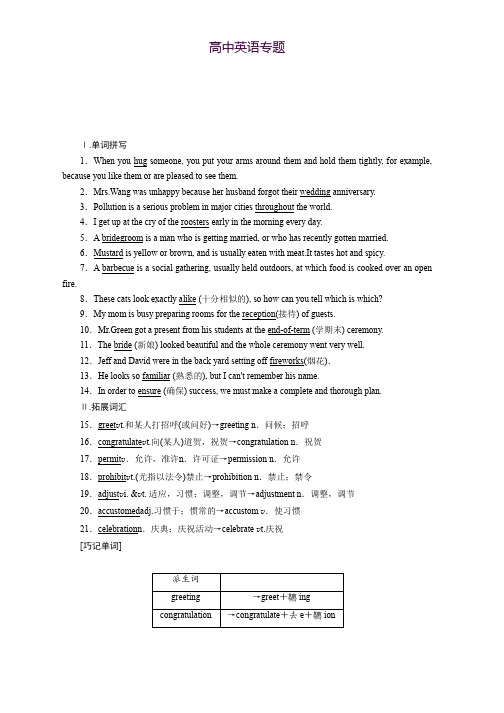
Ⅰ.单词拼写1.When you hug someone, you put your arms around them and hold them tightly, for example, because you like them or are pleased to see them.2.Mrs.Wang was unhappy because her husband forgot their wedding anniversary.3.Pollution is a serious problem in major cities throughout the world.4.I get up at the cry of the roosters early in the morning every day.5.A bridegroom is a man who is getting married, or who has recently gotten married.6.Mustard is yellow or brown, and is usually eaten with meat.It tastes hot and spicy.7.A barbecue is a social gathering, usually held outdoors, at which food is cooked over an open fire.8.These cats look exactly alike (十分相似的), so how can you tell which is which?9.My mom is busy preparing rooms for the reception(接待) of guests.10.Mr.Green got a present from his students at the end-of-term (学期末) ceremony.11.The bride (新娘) looked beautiful and the whole ceremony went very well.12.Jeff and David were in the back yard setting off fireworks(烟花).13.He looks so familiar (熟悉的), but I can't remember his name.14.In order to ensure (确保) success, we must make a complete and thorough plan.Ⅱ.拓展词汇15.greet v t.和某人打招呼(或问好)→greeting n.问候;招呼16.congratulate v t.向(某人)道贺,祝贺→congratulation n.祝贺17.permit v.允许,准许n.许可证→permission n.允许18.prohibit v t.(尤指以法令)禁止→prohibition n.禁止;禁令19.adjust v i. &v t. 适应,习惯;调整,调节→adjustment n.调整,调节20.accustomed adj.习惯于;惯常的→accustom v.使习惯21.celebration n.庆典;庆祝活动→celebrate v t.庆祝[巧记单词]→greet+ing→congratulate+去e+ion→adjust+mentⅢ.补全短语1.adjust to 适应2.get/be/become accustomed to习惯于3.be familiar with通晓;熟悉4.be amazed at对……感到吃惊5.take off脱下,除掉;起飞6.be similar to与……相似7.on the one hand 一方面8.do without设法对付过去;没有……也行9.share/have sth. in common 有共同点10.set off燃放1.[教材原句]Roosters are supposed to drive bad spirits away from the wedding ceremony, and hens are thought to ensure good luck for the marriage.公鸡被认为能够把坏运气从婚礼上赶走,而母鸡被认为能保证给婚姻带来好运。
2019学年高二英语人教版选修6练习:Unit 3《A healthy life》Section Ⅰ(含解析)
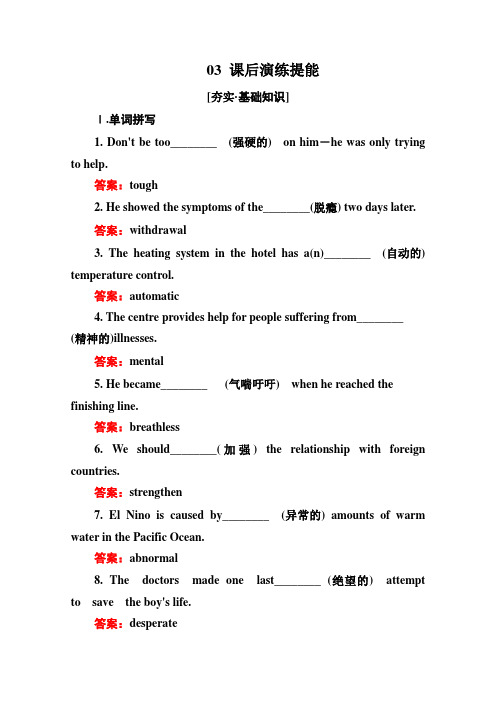
03 课后演练提能[夯实·基础知识]Ⅰ.单词拼写1. Don't be too________ (强硬的) on him-he was only trying to help.答案:tough2. He showed the symptoms of the________(脱瘾) two days later.答案:withdrawal3. The heating system in the hotel has a(n)________ (自动的) temperature control.答案:automatic4. The centre provides help for people suffering from________ (精神的)illnesses.答案:mental5. He became________ (气喘吁吁) when he reached the finishing line.答案:breathless6. We should________(加强) the relationship with foreign countries.答案:strengthen7. El Nino is caused by________ (异常的) amounts of warm water in the Pacific Ocean.答案:abnormal8. The doctors made one last________ (绝望的) attempt to save the boy's life.答案:desperate9. The________ (影响) of the climate on us is direct.答案:effect10. He felt________ (羞愧的) for being late.答案:ashamedⅡ.介副词填空1. I read the report________and________ again, till I almost knew it by heart.答案:over; over2. His political reputation was tainted by his abuse________ the power.答案:of3. He has been accustomed________ the life in the mountain from his earliest boyhood.答案:to4. My parents have decided________ buying the red shoes for my birthday.答案:on5. Do you feel ________ shopping with me?答案:like6. I was ashamed ________ having lied to my teacher.答案:of7. He turned round and reached ________ the phone.答案:for8. The game was put off due________ the rain.答案:to9. Your pen writes________smoothly as mine.答案:as10. He is seriously addicted________ these drugs.答案:toⅢ. 完成句子1. It was a mistake________________(due).那是由于粗心而犯的错误。
译林版高中英语选修6讲义Unit 1 Section Ⅲ Grammar——非谓语动词(Ⅰ)
Section ⅢGrammar——非谓语动词(Ⅰ)语境自主领悟先观察原句后自主感悟1.People have always enjoyed laughing,and there has always been humour.2.Stand-up is a kind of comedy that is done on a stage bya comedian talking straight to audience members.3.A stand-up comedian may tease an audience member,or might decide to tell different jokes depending upon how the audience reacted to his or her previous jokes.4.He says it is because when he started practising stand-up as a child,he told himself jokes while standing in front of the mirror,brushing his teeth.5.They could only see him standing there moving his lips.ughing helps your body stay healthy and can even help you fight pain.7.To be a good actor,you need to know the vocabulary used on stage.8.The most famous are the Canadian Mark Roswell,known in China as Dashan,and David Moser (Mo Dawei)from the USA. 1.以上各句中,非谓语动词作主语的是:6;非谓语动词作宾语的是:1。
高中英语译林版选修6课件(江苏):Unit3PeriodOne WelcometotheunitRe
根据上文完成下列各题 1.What’s the main idea of the passage? To tell us different countries have different customs. 2.Why do people in Spain have a light breakfast and a late dinner? Because they tend to have a big lunch and it lasts long.
In Spain,lunch is often the biggest meal of the day,and can last two or three hours.For this reason many people eat a light breakfast and a late dinner.In Mexico,lunch is the time to relax,and many people prefer not to discuss business as they eat.In Britain,it’s not unusual to have a business meeting over breakfast.
内容索引
Period One Welcome to the unit & Reading
基础自测 课文预读 要点探究 当堂达标
基础自测
Ⅰ.重点单词
greet 1. vt.和某人打招呼(或问好)
ensure 2.
vt.保证,担保,确保
te
vt.向(某人)道贺,祝贺
receptio4n.
accustomvt.使习惯于
alike 11. adj.相像,十分相似
牛津译林版高中英语选修六《Unit 3 Understanding each other》Word power 教案 3
牛津译林版高中英语选修六Unit 3 Understanding each otherWord power教案Teaching aims:After learning this part, the students will be able to:1. know how to remember new vocabulary;2. know how the English words are borrowed from other language;3. know how to use idioms and know the development of vocabulary is connected with history. Teaching procedures:Step 1: lead in (PPT4-5)1.What’s your way to learn and remember English vocabulary?Remember the spelling of a word by its pronunciation;Remember the spelling of a word by analysing the formation of the word;Remember the meaning of a word by making a sentence with it;…2. It proves that knowing the origin of new words helps remember them.English is one of the most widely-spoken languages in the world and it is used as international working language in many places throughout the world. So it is possible that English borrowed words from other languages.Remember the meaning of a word by studying the origin of the word.Step 2: Presentation (PPT6-9)1.Part A: Fast readingRead the online article about English words borrowed from other languages and answer the following questions then finish the table.Why are there so many French words in English?What was Italy famous for in the 18th century?What does the writer think of the Germans?2. Part B: Learn more examples according to the spidergram.3. Part C, Fill in the blanks with the borrowed words in Part A and Part B. Complete the exerciseindividually first and then check the answers with the class.4. Consolidation: C heck students’ comprehension of the passage by using the following activity tofurther.Which words are borrowed from French?Which words are borrowed from Italian?Which words are borrowed from German?Which words are borrowed from Arabic?Step 3: V ocabulary extension (PPT10-13)1. Focus on Part D:These idioms all have a characteristic connection with an animal or a thing. Ask students to read the idiom and guess the meaning of each of them first. Then have students read explanations and learn their meanings.2. Learn more idioms like this:His face is as black as coal.Without glasses she is as blind as a bat.The child is as bright as a button.Be careful of him. He’s as cunning as a fox.The twins are as like as two peas.The beautiful girl is as proud as a peacock.It’s impossible to persuade him.He’s as stubborn as a mule.You can’t expect her to do that.She’s as timid as a rabbit.Step 4: HomeworkFinish the two exercises on page 122 in Workbook.。
译林牛津版高中英语选修6课件 Unit 3《Period Two Reading》课件1
Summary
1. Retell the dialogue using your own words. 2. 1)Work in groups to find out: ◆ what culture shock is. ◆ its causes and solutions. 2) Find out history of Bonfire Night.
1). List information about Bonfire Night in note-taking form: fall on 5th. Nov; light fires; hold parties; set off fireworks; have barbecues; have fun 2). What have you learned from the example? There are cultural differences even between native English speakers. Their customs are not ar understanding UK present USA wedding shoes gesture festival Korea Brunei
Why do we need to learn about other cultures’ traditions?
By learning different cultures’ traditions, we can: ◆ know what is appropriate behavior. ◆ communicate more effectively. ◆ strengthen relationship with others. ◆ avoid embarrassment, misunderstanding or offence. ◆ understand others better.
- 1、下载文档前请自行甄别文档内容的完整性,平台不提供额外的编辑、内容补充、找答案等附加服务。
- 2、"仅部分预览"的文档,不可在线预览部分如存在完整性等问题,可反馈申请退款(可完整预览的文档不适用该条件!)。
- 3、如文档侵犯您的权益,请联系客服反馈,我们会尽快为您处理(人工客服工作时间:9:00-18:30)。
Please match the words with their proper meanings. 1.greet A.tell sb.that you are pleased about their success or achievements 2.ensure B.a formal social occasion to welcome sb.or celebrate sth. 3.congratulate C.stop sth.from being done or used especially by law 4.reception D.say hello to sb.or to welcome sb. 5.prohibit E.make sure that sth.happens or is definite 6.adjust F.well known to you or easily recognized by you 7.familiar G.change sth.slightly in order to make it better or more accurate 8.permit H.allow sb.to do sth.or sth.to happen 答案:1.D 2.E 3.A 4.B 5.C 6.G 7.F 8.H
Match the following countries with the proper ceremony. A.the Netherlands B.South America C.Japan D.Thailand E.France F.the Middle East
Putting their hands together and bowing slightly Bowing to each other 1.________ 2.________ Hug each other Kissing a lady's hand 3.________ 4.________
Touching noses Kissing each other's cheeks 5.________ 6.________ 答案:1.D 2.C 3.B 4.E 5.F 6.A
Ⅰ.Fast-reading 1.According to the title we can learn the conversation is about cultural_differences. 2.The purpose of the conversation is that we_should_learn_about_the_cultural_differences_and_understand_more_about_each_other. Ⅱ.Careful-reading (Ⅰ)Choose the best answers according to the conversation. 1.________, it is rude not to open a present when someone gives you one. A.In the West B.In the Middle East C.In China D.In Japan 2.How does Waled feel about Korea's wedding ceremony where live chickens are used? A.Surprised. B.Interested. C.Puzzled. D.Bored. 3.In Brunei, a large number of foreigners find it hard to get used to ________. A.pointing to something with their thumb B.not sleeping at the wedding reception C.removing their shoes before stepping into someone's house D.not being allowed to drink alcohol at the wedding reception 答案:1.A 2.B 3.C (Ⅱ)Read the conversation and decide whether the following statements are true (T) or false (F). 1.In the Middle East, it is rude not to open a present when someone gives you one.( F ) 2.If a man joins in a wedding reception in Brunei, he has to sit with the bridegroom and the other men.( T ) 3.They had a live hen and a rooster as a part of the wedding ceremony in Korea.( T ) 4.If you attend a wedding ceremony in Brunei, chances are that you can't drink coffee.( F ) (Ⅲ)Fill in each blank with no more than three words according to the conversation.
Ⅲ.Study-reading Analyze the following difficult sentences in the conversation. 1.Waled, why don't you tell her about the British teacher who opened the present as soon as he received it at the end-of-term ceremony? [句式分析]
[尝试翻译] 瓦利德,为什么不给她讲一讲那位英国老师在期末典礼上一收到礼物就打开看的事呢? 2.During the ceremony, the hen laid an egg, and everyone congratulated the new couple because it was considered very lucky. [句式分析] [尝试翻译] 在婚礼期间,那只母鸡下了一个蛋,这被看作是件非常幸运的事,所以大家都祝贺这一对新人。 3.I think now I understand a lot more about different cultures and what is appropriate behaviour. [句式分析]
[尝试翻译] 我想现在我对不同的文化以及得体的行为举止有了更多的了解。 Ⅳ.Post-reading Fill in the blanks according to the conversation. Ma Li has to do her homework on cultural ①differences,_so she has gone to the student centre to find ②information for her homework. There are different ③reactions in the West and the East when they get presents. Westerners like to open them as soon as they get them. When it comes to wedding traditions, there are also differences. In Korea, it is believed that roosters can drive bad spirits away from the wedding ④ceremony,_and hens can ensure good luck for the ⑤marriage. In Brunei, at wedding ⑥receptions men and women have to sit in ⑦separate areas — the men with the bridegroom, and the women with the bride. What's more, if you go to Brunei, you would have to take off your shoes ⑧_before going into someone's house. There are sometimes great cultural differences even between ⑨native English speakers. The British B10celebrate Bonfire Night every year, while many Americans are not familiar with the festival.
[课 文 对 译] 2019-2020年高二英语译林版选修6教学案:Unit 3 Section 1(含答案) Ma Li:Hi, everyone.My name's Ma Li.I need some help with my homework — it's about cultural differences.Can I sit down and talk to you? Waled:Hi, Ma Li, I'm Waled from Brunei. Peter:And I'm Peter, from the UK.Nice to meet you. Ma Li:Nice to meet you, too.Can you tell me about some cultural differences you have found? Peter:Waled, why don't you tell her about the British teacher who opened the present as soon as he received it at the end-of-term ceremony? Ma Li:Oh, I already know about that one.My American friend Jack did the same thing. Peter:Well, it's what we do in the West.It's rude not to open a present when someone gives you one.We like to see how the person reacts.We think it's strange not to open it!What would be another cultural difference ...let me think.Well, I once went to an acquaintance's wedding in Korea and I was very surprised. Ma Li:Why was that? Peter:Well, they had a live hen and a rooster as a part of the wedding ceremony. Ma Li:Live chickens? Peter:Yes.Roosters are supposed to drive bad spirits away from the wedding ceremony, and hens are thought to ensure good luck for the marriage.During the ceremony, the hen laid an egg, and everyone congratulated the new couple because it was considered very lucky. Waled:That's interesting!In Brunei,at wedding receptions men and women have to sit in separate areas — the men with the bridegroom, and the women with the bride.Another difference is that while we serve food, soft drinks, tea and coffee, alcohol is not permitted at the wedding reception — in fact, alcohol is altogether prohibited in Brunei.And you probably wouldn't get much sleep if you lived near where a wedding reception was being held.That's because we play loud drums to celebrate the wedding for hours afterwards, and sometimes even throughout the night! Peter:Throughout the night? Waled:Yeah, people get used to it. Ma Li:So what other things do you do in your country that are different from other countries, Waled? Waled:Well,you know in many countries people point with their first finger.However, in Brunei that can cause offence,so we use our thumb to point.It's quite funny watching the new foreign teachers trying to adjust to doing that.Another thing is,if you came to Brunei,you would have to take off your shoes before going into someone's house.Many foreigners have trouble getting accustomed to it.
